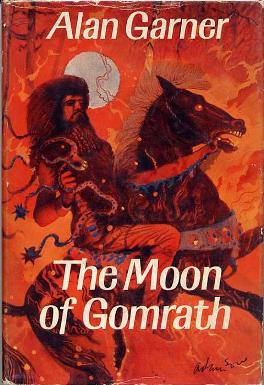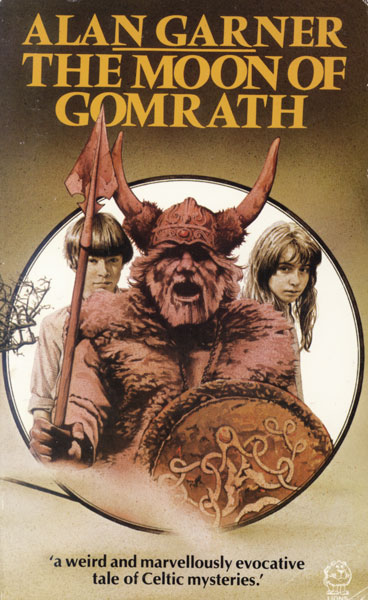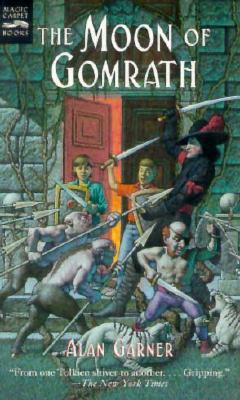
“The more I learn, the more I am convinced there are no original stories originality now means the personal coloring of existing themes, and some of the richest ever expressed are in the folklore of Britain. But this very richness makes the finding of a way to any understanding of the imagery and incident impossible without scholarship.” Alan Garner in http://alangarner.atspace.org/adderlytales.html
Garner’s immersion in, and fascination with, folklore and mythology is nowhere more explicit than in his second book The Moon of Gomrath where he lays a trail of bread crumbs into the labyrinth of folklore. The novel deftly works on many levels and succeeds in merging deep academic research, local topographical knowledge and a gift for storytelling into a seemingly simple tale of magic and adventure.

In The Moon of Gomrath Garner explores older, wilder forms of magic – elemental and ancient magic – cyclical earth/moon magic.
“For the Old Magic is sun magic and moon magic, and it is blood magic… it is woman’s magic, too…”
“On, on, on, on, faster, faster the track drew him, flowed through him, filled his lungs and his heart and his mind with fire, sparked from his eyes, streamed from his hair, and the bells and the music and the voices were all of him, and the Old Magic sang to him from the depths of the earth and the caverns of the night blue sky.”

Again the story involves two children, boy and girl. Again it’s follows a classic episodic form (threat – response – chase – capture – escape – denouement) and explores the binaries of light/dark; rational-intellectual/emotional-instinctive; good/evil; mind/body…
It’s a story rich in folkloric tropes – an enchanted amulet; a fellowship; an ancient, formless evil… but to these Garner interweaves a young girl’s exposure to an ‘other’ dimension; a young boy’s quest for the mythical to ensure her return; a wendfire on the Eve of Gomrath releasing the Wild Hunt, and it all hurtles breathlessly towards a battle between arch-witch Morrigan (dark) and the elfin lios-alfar (light).

Garner is a master at evoking both the wonder and terror of the mythical forces that hide just behind the mundane surface of the world, the uncanny that remains largely beyond human comprehension, even when directly encountered.
“Susan looked at him, and was not afraid. Her mind could not accept him, but something deeper could. She knew what made the horses kneel. Here was the heart of all wild things. Here were thunder, lightning, storm; the slow beat of tides and seasons, birth and death, the need to kill and the need to make…”
It’s this sense of ambiguity, of things too huge to be completely grasped, that gives this work such imaginative power.

There are Big Ideas here too. Old Magic versus High Magic, the ordinary world and the world of myth as two sides of a single reality but Garner generally has a sure and light touch and though he exposes the reader to references and ideas, these resonate within the action rather than bogging it down.
Much is suggested, little is fully explained.
Garner puts in just enough hints and scholarly references to enable any reader, so minded, to follow his crumb trail into the woods. Or to enjoy the quiet conversations in the shadows of subtexts. It’s this layering of information into the fast-paced story that makes The Moon of Gombrath a more satisfying read than the enduring Weirdstone of Brisingamen.
The book’s closing paragraphs are tantalisingly ambiguous.
“But as they crossed the valley, one of the riders dropped behind, and Colin saw that it was Susan. She lost ground, though her speed was no less, and the light that formed her died, and in its place was a smaller, solid figure that halted, forlorn, in the white wake of the riding.
The horsemen climbed from the hillside to the air, growing vast in the sky, and to meet them came nine women, their hair like wind. And away they rode together across the night, over the waves, and beyond the isles, and the Old Magic was free for ever, and the moon was new.”
Is it a victory or loss?
Is it a beginning or end?
Garner allows the reader the welcome freedom to decide.